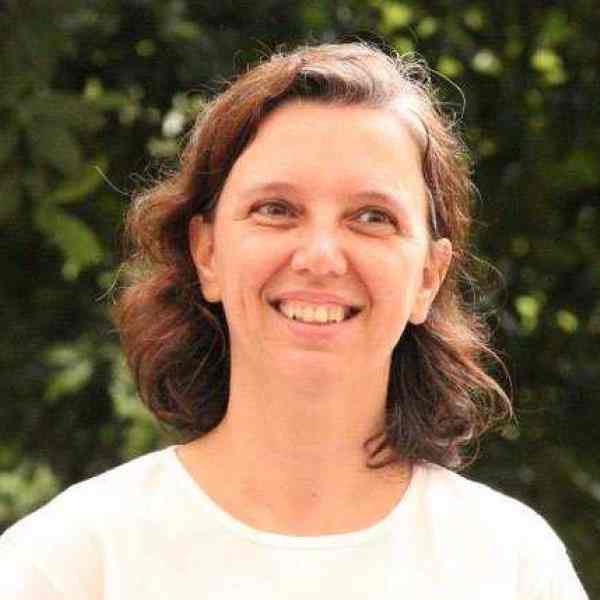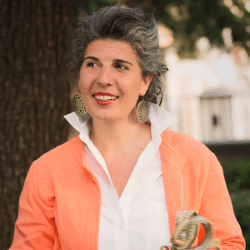Introduction
Adriana Costa uses a "Games Bus" to bring cognitive and social development activities to severely deprived children in poor and crowded urban communities, as well to stimulate continuing parental and community action. Launched in low-income communities in São Paulo, the program is now spreading to neighboring cities.
The New Idea
Adriana Costa is persuaded, with ample supporting evidence from current research, that intellectual stimulation and carefree play in early childhood have immensely important, lifelong consequences for mental and social development. She is also convinced that when mothers grasp the connection between games, toys, and play and the development of happy children with enthusiasm for learning, they will find ways to provide their children with the needed opportunities on a regular basis.Reflecting those convictions, the program that Adriana has developed over the past several years employs an unusually imaginative approach in bringing new opportunities for creative play and learning to children from the age of two upwards in some of the poorest communities in the São Paulo metropolitan area and neighboring cities. In a pilot initiative under the aegis of the Catholic University of São Paulo and with funding from foreign and local sources, a bus was acquired and specially fitted out with play spaces and stocks of toys, books, games and art materials. On a regular schedule (involving daylong visits on a once or twice per week basis), the "Games Bus" visits specific locations in target communities, where a team of four professionals–two teachers, one art educator and a psychologist (Adriana)–organize a wide array of games and other activities both inside the bus and in play spaces nearby.In addition to attracting and engaging the interest of large numbers of children at each of its stops, the "Games Bus" serves as a neighborhood gathering point for mothers and other adult members of the communities visited. Taking advantage of that fact, Adriana and her colleagues use their repeated visits to the communities to spread awareness of children's development needs, to teach mothers and others basic child stimulation techniques and to encourage parental and community action to address child development needs on a continuing basis. The visits to particular communities continue over a two- year period, at the end of which, with support from the program, a collection of toys, games and other learning materials is established in a permanent children's resource center.
The Problem
Although Brazil is now classified as an "upper-middle-income" country in the World Bank's studies of developing economies, income distribution is extremely skewed and a substantial majority of Brazilian children are born and raised in conditions of marked economic deprivation. The situation is particularly grim for children in favelas and other low-income communities in São Paulo and similarly crowded metropolitan areas.One of saddest and most disturbing consequences of widespread urban poverty is its lastingly adverse effects on the cognitive and social development of young children. From very young ages onward, most children in favelas and other crowded, low-income urban settings find relatively few opportunities for the intellectual stimulation, play and carefree interaction with other young people that are crucially important for the development of their mental and social skills. By the time that they enter school, the results of those deprivations are painfully apparent both in sharply lower rates of learning and academic achievement and in classroom demeanor. With the passage of time, they are manifested in high truancy, grade repetition, drop-out rates and, not infrequently, in various forms of anti-social behavior.Although no single intervention can arrest or reverse the cycle just described, research in many low-income communities around the world strongly suggests that heightened access to toys and greater opportunities for participation in games and independent discovery at an early age can make an important and lasting difference, especially if fortified by other changes in parent/child interactions. Accordingly, one important dimension of the task of helping economically deprived children realize their full potentials is to devise affordable and effective ways of making such opportunities widely available in severely impoverished communities.
The Strategy
In addition to providing timely and important services to large numbers of economically deprived children, the "Games Bus" program heightens public awareness of child development needs and offers practical training in how to address those needs. Adriana and her colleagues place considerable emphasis on transferring their skills in child development to mothers and other individuals in the communities that the "Games Bus" serves. They also use the program as a training ground in child development techniques for university student interns in child psychology, education and related fields.The children's resource centers that are established in participating communities at the end of the two-year cycle of "Games Bus" visits provide continuing child development services (e.g., as child care centers and children's libraries), but their most important function is to assure a continuing community focus on children's development and educational needs. During the course of their visits to participating communities, "Games Bus" staff counsel parents and community leaders on methods for pressuring municipal governments and other public agencies to provide better public schools and other child-oriented services. The children's resource centers serve as a continuing focal point for community organization around children's needs.Adriana plans to extend and replicate the "Games Bus" project throughout the state of São Paulo and elsewhere in Brazil. Similar programs have already been launched in three smaller cities in the state (Campinas, Ourinhos and Garça) with the support of municipal governments and local businesses, and several other communities have requested Adrian's help in establishing "Games Bus" programs. In an effort to stimulate such ventures and to facilitate exchange of information and ideas among ongoing programs, Adriana has formed an informal "Games Bus" association that organizes regular meetings of staff members of the four programs now in operation.
The Person
Born and raised in São Paulo, Adriana studied psychology and history at the Catholic University in that city. She has also completed special courses in art education, the cognitive development of young children, and teaching methods at the University of São Paulo.Adriana worked in several projects involving art education, environmental education, and training for child-care workers during the years immediately following her university studies. Since 1992, she has been fully immersed in the project described above.




